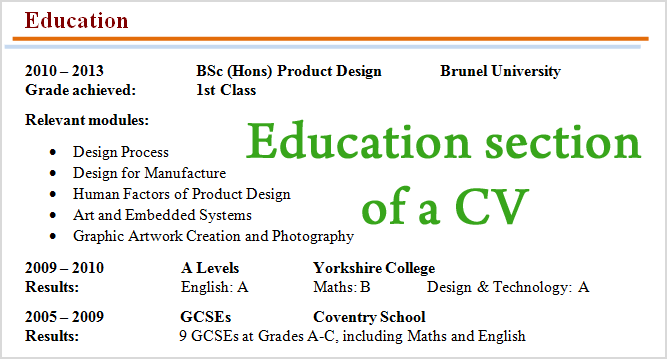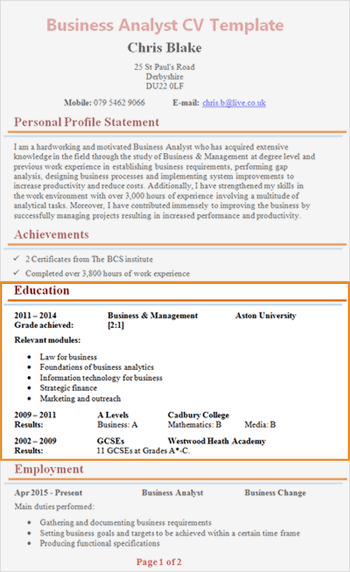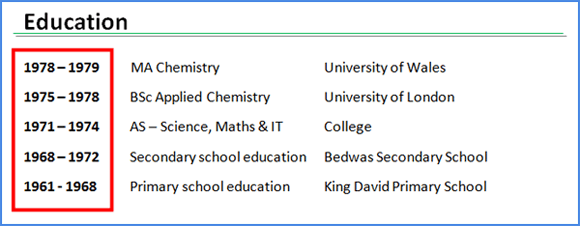 Sobhan Mohmand, Career Expert
Sobhan Mohmand, Career Expert  3 Jan 2021
3 Jan 2021
The Education section of your CV gives the employer a brief overview of your education, studies and qualifications to date. Alongside the Employment section, it is considered to be one of the most important parts of your CV.

You can include any of the following in this part of your CV:
Studies that you can list in this section include:
If you are highly educated (i.e. you hold a Master’s degree or PhD) or you are a senior professional, you should not include your school’s GCSE results on your CV. This information would be considered highly irrelevant and outdated at this stage in your career.
In all other cases, it is a good idea to list or mention your GCSEs in this section of your CV because GCSEs are highly valued by employers and most jobs require candidates to have GCSEs in at least English and Maths at grades C or above.
There are two acceptable ways of listing your GCSEs on your CV:
This is the ideal format for school leavers or those that apply for their first job.
As can be seen from the first approach above, it takes up a lot of precious space of your CV that can be better utilised for other information.
Instead, you could write it in one simple sentence:
This is the recommended format for most candidates who are university students or graduates or already have some relevant work experience.
For higher level qualifications, such as A-Levels, it is essential that you are more descriptive on the subjects and grades awarded of the qualifications.
Do not write:
That doesn’t mean anything to the employer!
Instead, you should mention the subjects and results of your A-Levels:
If you’d like to list down your A-Levels instead of writing it as one sentence:

If you want to find out how to write your degree on your CV, make sure you follow the guidelines outlined in How to present your degree on your CV.
It contains tons of examples and tips on how to get this right – even if you are still studying and haven’t graduated yet.
That depends on the CV format that you have selected.
Some CVs have a separate ‘Qualifications’ section in which candidates can list their additional professional or vocational training qualifications.
Other CVs do not have this section.
If your CV does not contain this separate section then you could include your professional training and qualifications in the Education section or in the Employment section of your CV, depending on the type of training or qualification.
A CV’s ‘Education’ section usually comes straight after the ‘Employment’ or ‘Work Experience’ section. This is the most common approach adopted by most candidates and favoured by employers.
The following are exceptional cases in which you would place the ‘Education’ section before the ‘Employment’ section:

Both of these approaches are correct, and it comes down to your personal choice and preference which format you adopt for your CV.
There are dozens of terms and abbreviations that are used to describe courses and qualifications. Do not assume that the prospective employer, who may not be highly experienced, to be familiar with all types of qualifications and their significance.
Consider the following terms for various levels/types of qualifications:
Ask yourself: Will the prospective employer understand all the academic terms and abbreviations that I have written in my CV’s education section?
If in doubt, expand on these terms by using the full title rather than a simple abbreviation and also state at what level they were taken.
The following is the minimum information that is required for each entry in this section:
What do you write first?
The answer is… it depends 🙂
Which approach is the best for you depends entirely on your personal circumstances and preferences:
The most common format for writing education and employment entries on a CV is to first mention the dates followed by other information. This is the approach that we have taken in our CV examples.
If, however, you are senior in age you should never list the dates first.

This may make the potential employer think,
“Gosh, this candidate finished their secondary education before I was even born!”
We have already discussed the implications of mentioning one’s age or date of birth on one’s CV.
Best practise: Mention the course or the institution first, drawing away the reader’s attention to these other details rather than focusing on dates.
If the educational institution (college or university) that you studied in is a prestigious institution, you should write the name of the institution first.
For example:

Studied at Cambridge University? Not bad… not bad at all.
If the course that you studied is significantly related to the job that you are applying for, you should write down your course name first.
If you are applying for a Business Manager position:
![]()
Remember: be consistent! Prospective employers do not have time for solving puzzles. Choose one particular format and stick to it throughout your CV.
There are a number of different ways in which you can present your education or qualifications on your CV. There is no single “right” way of doing it.
Below you will find 3 good examples of how to present this section on your CV:
Relevant modules:
2013 – 2014 A-Levels Mayfield College
Subjects: History (B) Geography (A) English Literature (B)
2006 – 2013 GCSEs Aspire Academy
Results: 10 GCSEs at Grades A-C, including Maths and English.
2003-2009 Strafford High School
2-week training in Personal Safety (including in First Aid)
10 GCSEs at grades A*–C
Relevant Units:
2009 – 2016 GCSEs Monk’s Hill School
Results:
Good luck!